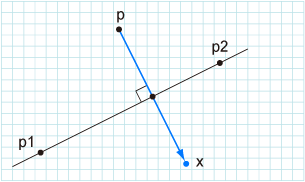Reflection
For given three points p1, p2, p, find the reflection point x of p onto p1p2.

Input
xp1 yp1 xp2 yp2 q xp0 yp0 xp1 yp1 ... xpq−1 ypq−1
In the first line, integer coordinates of p1 and p2 are given. Then, q queries are given for integer coordinates of p.
Output
For each query, print the coordinate of the reflection point x. The output values should be in a decimal fraction with an error less than 0.00000001.
Constraints
- 1 ≤ q ≤ 1000
- -10000 ≤ xi, yi ≤ 10000
- p1 and p2 are not identical.
Sample Input 1
0 0 2 0 3 -1 1 0 1 1 1
Sample Output 1
-1.0000000000 -1.0000000000 0.0000000000 -1.0000000000 1.0000000000 -1.0000000000
Sample Input 2
0 0 3 4 3 2 5 1 4 0 3
Sample Output 2
4.2400000000 3.3200000000 3.5600000000 2.0800000000 2.8800000000 0.8400000000
题目连接:http://judge.u-aizu.ac.jp/onlinejudge/description.jsp?id=CGL_1_B
#include<string.h>
#include<algorithm>
#include<stdio.h>
#include<complex>
using namespace std;
typedef complex<double> qua;
qua solve(qua a,qua b,qua c)
{
b=b-a,c=c-a;
return a+b*conj(c/b);
}
int main()
{
int m;
double x1,y1,x2,y2,x3,y3;
scanf("%lf%lf%lf%lf%d",&x1,&y1,&x2,&y2,&m);
while(m--)
{
scanf("%lf%lf",&x3,&y3);
qua ans=solve(qua(x1,y1),qua(x2,y2),qua(x3,y3));
printf("%.8f %.8f\n",ans.real(),ans.imag());
qua b =qua(x2,y2);
}
}








 本文详细介绍了一个几何算法,用于计算平面中一点关于另一条线段的反射点。通过给出的输入和输出样例,展示了如何使用复数进行计算,提供了一个完整的C++代码实现。
本文详细介绍了一个几何算法,用于计算平面中一点关于另一条线段的反射点。通过给出的输入和输出样例,展示了如何使用复数进行计算,提供了一个完整的C++代码实现。
















 2508
2508

 被折叠的 条评论
为什么被折叠?
被折叠的 条评论
为什么被折叠?








